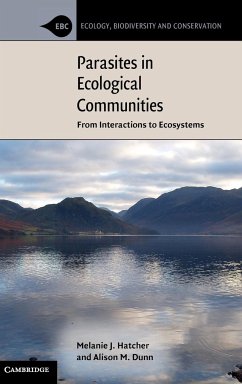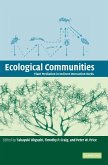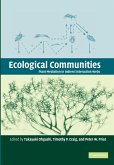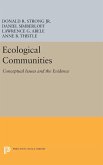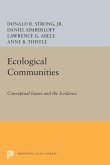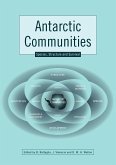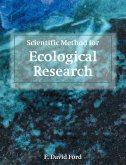- Gebundenes Buch
- Merkliste
- Auf die Merkliste
- Bewerten Bewerten
- Teilen
- Produkt teilen
- Produkterinnerung
- Produkterinnerung
Links community ecology and epidemiology to demonstrate how parasites affect species interactions and consequently ecosystem function, invasions and emerging diseases.
Andere Kunden interessierten sich auch für
![Ecological Communities Ecological Communities]() Takayuki Ohgushi / Timothy P. Craig / Peter W. Price (eds.)Ecological Communities180,99 €
Takayuki Ohgushi / Timothy P. Craig / Peter W. Price (eds.)Ecological Communities180,99 €![Ecological Communities and Processes in a Mojave Desert Ecosystem Ecological Communities and Processes in a Mojave Desert Ecosystem]() Philip W. RundelEcological Communities and Processes in a Mojave Desert Ecosystem52,99 €
Philip W. RundelEcological Communities and Processes in a Mojave Desert Ecosystem52,99 €![Ecological Communities Ecological Communities]() Ecological Communities74,99 €
Ecological Communities74,99 €![Ecological Communities Ecological Communities]() Ecological Communities276,99 €
Ecological Communities276,99 €![Ecological Communities Ecological Communities]() Ecological Communities98,99 €
Ecological Communities98,99 €![Antarctic Communities Antarctic Communities]() Antarctic Communities61,99 €
Antarctic Communities61,99 €![Scientific Method for Ecological Research Scientific Method for Ecological Research]() E. David FordScientific Method for Ecological Research109,99 €
E. David FordScientific Method for Ecological Research109,99 €-
-
-
Links community ecology and epidemiology to demonstrate how parasites affect species interactions and consequently ecosystem function, invasions and emerging diseases.
Hinweis: Dieser Artikel kann nur an eine deutsche Lieferadresse ausgeliefert werden.
Hinweis: Dieser Artikel kann nur an eine deutsche Lieferadresse ausgeliefert werden.
Produktdetails
- Produktdetails
- Verlag: Cambridge University Press
- Seitenzahl: 462
- Erscheinungstermin: 16. Juni 2011
- Englisch
- Abmessung: 235mm x 157mm x 29mm
- Gewicht: 815g
- ISBN-13: 9780521889704
- ISBN-10: 0521889707
- Artikelnr.: 33260633
- Herstellerkennzeichnung
- Libri GmbH
- Europaallee 1
- 36244 Bad Hersfeld
- gpsr@libri.de
- Verlag: Cambridge University Press
- Seitenzahl: 462
- Erscheinungstermin: 16. Juni 2011
- Englisch
- Abmessung: 235mm x 157mm x 29mm
- Gewicht: 815g
- ISBN-13: 9780521889704
- ISBN-10: 0521889707
- Artikelnr.: 33260633
- Herstellerkennzeichnung
- Libri GmbH
- Europaallee 1
- 36244 Bad Hersfeld
- gpsr@libri.de
Melanie J. Hatcher is Visiting Research Fellow, School of Biology, University of Bristol, and Senior Research Fellow, Institute of Integrative and Comparative Biology, University of Leeds.
Part I. Introduction
Part II. Parasites and Competitors: 1. Introduction
2. One host-one parasite systems
3. Apparent competition
4. Parasite-mediated competition
5. Parasite-modified competition
6. Examples from conservation and management
7. Competition between parasites
8. Conclusions
Part III. Parasites and Predators: 9. Introduction
10. Parasites of prey with specialist predators
11. Parasites of prey with generalist predators
12. Parasites of predator
13. Parasites of predator and prey
14. Applications: predator control and harvesting
15. Conclusions
Part IV. Parasites and Intraguild Predation: 16. Introduction
17. Ecological significance of IGP
18. IGP as a unifying framework for competition and predation
19. Parasites intrinsic to IGP
20. Parasites extrinsic to IGP
21. Models of parasitism extrinsic to IGP
22. IGP and the evolution of host-parasite relationships
23. Conclusions
Part V. Plant Pathogens and Parasitic Plants: 24. Introduction: parasitism of plants
25. Soil borne pathogens
26. Plant defence strategies
27. Parasitic plants
28. Endophytes
29. Conclusions
Part VI. Parasites and Invasions: 30. Introduction
31. Parasite introduction and acquisition
32. Loss of parasites by invaders: enemy release
33. Invasions and host-parasite co-evolution
34. The impact of parasitism on biological invasion
35. Conclusions
Part VII. Ecosystem Parasitology: 36. Introduction
37. Trophic cascades
38. Parasite dynamics in multihost communities
39. Biodiversity and disease
40. Parasites in the food web
41. Bioenergetic implications of parasitism
42. Ecosystem engineering
43. Ecosystem health
44. Evolutionary considerations
45. Conclusions
Part VIII. Emerging Diseases in Humans and Wildlife: 46. Introduction
47. The process of disease emergence
48. The evolution of emergence
49. Phylogenetic and temporal patterns of emergence
50. Environmental change and emergence
51. Conservation and control
52. Conclusions
Part IX. Where Do We Go From Here?
References
Index.
Part II. Parasites and Competitors: 1. Introduction
2. One host-one parasite systems
3. Apparent competition
4. Parasite-mediated competition
5. Parasite-modified competition
6. Examples from conservation and management
7. Competition between parasites
8. Conclusions
Part III. Parasites and Predators: 9. Introduction
10. Parasites of prey with specialist predators
11. Parasites of prey with generalist predators
12. Parasites of predator
13. Parasites of predator and prey
14. Applications: predator control and harvesting
15. Conclusions
Part IV. Parasites and Intraguild Predation: 16. Introduction
17. Ecological significance of IGP
18. IGP as a unifying framework for competition and predation
19. Parasites intrinsic to IGP
20. Parasites extrinsic to IGP
21. Models of parasitism extrinsic to IGP
22. IGP and the evolution of host-parasite relationships
23. Conclusions
Part V. Plant Pathogens and Parasitic Plants: 24. Introduction: parasitism of plants
25. Soil borne pathogens
26. Plant defence strategies
27. Parasitic plants
28. Endophytes
29. Conclusions
Part VI. Parasites and Invasions: 30. Introduction
31. Parasite introduction and acquisition
32. Loss of parasites by invaders: enemy release
33. Invasions and host-parasite co-evolution
34. The impact of parasitism on biological invasion
35. Conclusions
Part VII. Ecosystem Parasitology: 36. Introduction
37. Trophic cascades
38. Parasite dynamics in multihost communities
39. Biodiversity and disease
40. Parasites in the food web
41. Bioenergetic implications of parasitism
42. Ecosystem engineering
43. Ecosystem health
44. Evolutionary considerations
45. Conclusions
Part VIII. Emerging Diseases in Humans and Wildlife: 46. Introduction
47. The process of disease emergence
48. The evolution of emergence
49. Phylogenetic and temporal patterns of emergence
50. Environmental change and emergence
51. Conservation and control
52. Conclusions
Part IX. Where Do We Go From Here?
References
Index.
Part I. Introduction
Part II. Parasites and Competitors: 1. Introduction
2. One host-one parasite systems
3. Apparent competition
4. Parasite-mediated competition
5. Parasite-modified competition
6. Examples from conservation and management
7. Competition between parasites
8. Conclusions
Part III. Parasites and Predators: 9. Introduction
10. Parasites of prey with specialist predators
11. Parasites of prey with generalist predators
12. Parasites of predator
13. Parasites of predator and prey
14. Applications: predator control and harvesting
15. Conclusions
Part IV. Parasites and Intraguild Predation: 16. Introduction
17. Ecological significance of IGP
18. IGP as a unifying framework for competition and predation
19. Parasites intrinsic to IGP
20. Parasites extrinsic to IGP
21. Models of parasitism extrinsic to IGP
22. IGP and the evolution of host-parasite relationships
23. Conclusions
Part V. Plant Pathogens and Parasitic Plants: 24. Introduction: parasitism of plants
25. Soil borne pathogens
26. Plant defence strategies
27. Parasitic plants
28. Endophytes
29. Conclusions
Part VI. Parasites and Invasions: 30. Introduction
31. Parasite introduction and acquisition
32. Loss of parasites by invaders: enemy release
33. Invasions and host-parasite co-evolution
34. The impact of parasitism on biological invasion
35. Conclusions
Part VII. Ecosystem Parasitology: 36. Introduction
37. Trophic cascades
38. Parasite dynamics in multihost communities
39. Biodiversity and disease
40. Parasites in the food web
41. Bioenergetic implications of parasitism
42. Ecosystem engineering
43. Ecosystem health
44. Evolutionary considerations
45. Conclusions
Part VIII. Emerging Diseases in Humans and Wildlife: 46. Introduction
47. The process of disease emergence
48. The evolution of emergence
49. Phylogenetic and temporal patterns of emergence
50. Environmental change and emergence
51. Conservation and control
52. Conclusions
Part IX. Where Do We Go From Here?
References
Index.
Part II. Parasites and Competitors: 1. Introduction
2. One host-one parasite systems
3. Apparent competition
4. Parasite-mediated competition
5. Parasite-modified competition
6. Examples from conservation and management
7. Competition between parasites
8. Conclusions
Part III. Parasites and Predators: 9. Introduction
10. Parasites of prey with specialist predators
11. Parasites of prey with generalist predators
12. Parasites of predator
13. Parasites of predator and prey
14. Applications: predator control and harvesting
15. Conclusions
Part IV. Parasites and Intraguild Predation: 16. Introduction
17. Ecological significance of IGP
18. IGP as a unifying framework for competition and predation
19. Parasites intrinsic to IGP
20. Parasites extrinsic to IGP
21. Models of parasitism extrinsic to IGP
22. IGP and the evolution of host-parasite relationships
23. Conclusions
Part V. Plant Pathogens and Parasitic Plants: 24. Introduction: parasitism of plants
25. Soil borne pathogens
26. Plant defence strategies
27. Parasitic plants
28. Endophytes
29. Conclusions
Part VI. Parasites and Invasions: 30. Introduction
31. Parasite introduction and acquisition
32. Loss of parasites by invaders: enemy release
33. Invasions and host-parasite co-evolution
34. The impact of parasitism on biological invasion
35. Conclusions
Part VII. Ecosystem Parasitology: 36. Introduction
37. Trophic cascades
38. Parasite dynamics in multihost communities
39. Biodiversity and disease
40. Parasites in the food web
41. Bioenergetic implications of parasitism
42. Ecosystem engineering
43. Ecosystem health
44. Evolutionary considerations
45. Conclusions
Part VIII. Emerging Diseases in Humans and Wildlife: 46. Introduction
47. The process of disease emergence
48. The evolution of emergence
49. Phylogenetic and temporal patterns of emergence
50. Environmental change and emergence
51. Conservation and control
52. Conclusions
Part IX. Where Do We Go From Here?
References
Index.

